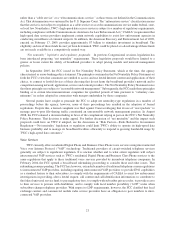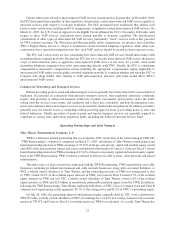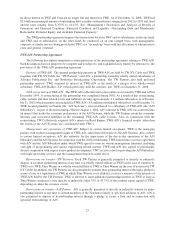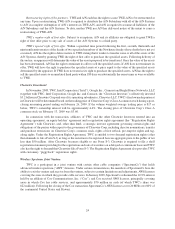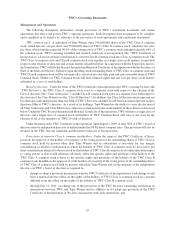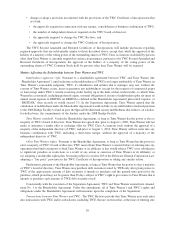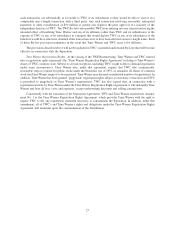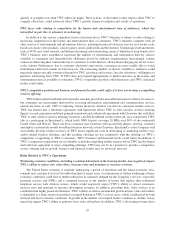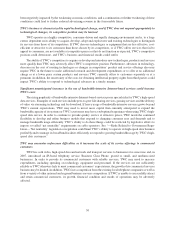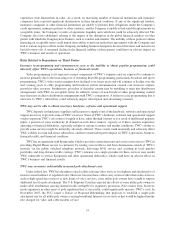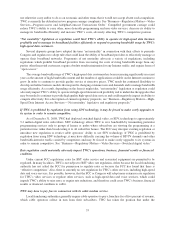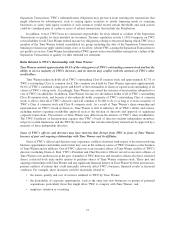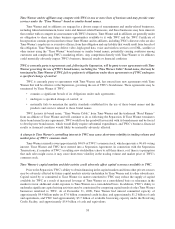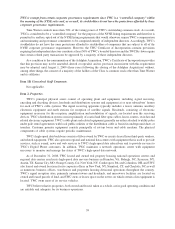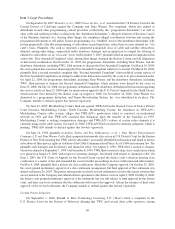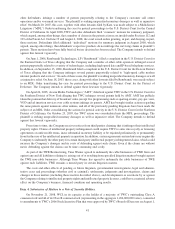Time Warner Cable 2008 Annual Report Download - page 41
Download and view the complete annual report
Please find page 41 of the 2008 Time Warner Cable annual report below. You can navigate through the pages in the report by either clicking on the pages listed below, or by using the keyword search tool below to find specific information within the annual report.TWC relies on network and information systems and other technology, and a disruption or failure of such
networks, systems or technology as a result of computer viruses, misappropriation of data or other malfeasance,
as well as outages, natural disasters, accidental releases of information or similar events, may disrupt TWC’s
business.
Because network and information systems and other technologies are critical to TWC’s operating activities,
network or information system shutdowns caused by events such as computer hacking, dissemination of computer
viruses, worms and other destructive or disruptive software, denial of service attacks and other malicious activity, as
well as power outages, natural disasters, terrorist attacks and similar events, pose increasing risks. Such an event
could have an adverse impact on TWC and its customers, including degradation of service, service disruption,
excessive call volume to call centers and damage to TWC’s plant, equipment and data. Such an event also could
result in large expenditures necessary to repair or replace such networks or information systems or to protect them
from similar events in the future. Significant incidents could result in a disruption of TWC’s operations, customer
dissatisfaction, or a loss of customers or revenues.
Furthermore, TWC’s operating activities could be subject to risks caused by misappropriation, misuse,
leakage, falsification and accidental release or loss of information maintained in TWC’s information technology
systems and networks, including customer, personnel and vendor data. TWC could be exposed to significant costs if
such risks were to materialize, and such events could damage the reputation and credibility of TWC and its business
and have a negative impact on its revenues. TWC also could be required to expend significant capital and other
resources to remedy any such security breach. As a result of the increasing awareness concerning the importance of
safeguarding personal information, the potential misuse of such information and legislation that has been adopted or
is being considered regarding the protection, privacy and security of personal information, information-related risks
are increasing, particularly for businesses like TWC’s that handle a large amount of personal customer data.
TWC’s business may be adversely affected if TWC cannot continue to license or enforce the intellectual property
rights on which its business depends.
TWC relies on patent, copyright, trademark and trade secret laws and licenses and other agreements with its
employees, customers, suppliers, and other parties, to establish and maintain its intellectual property rights in
technology and the products and services used in TWC’s operations. However, any of TWC’s intellectual property
rights could be challenged or invalidated, or such intellectual property rights may not be sufficient to permit TWC to
take advantage of current industry trends or otherwise to provide competitive advantages, which could result in
costly redesign efforts, discontinuance of certain product or service offerings or other competitive harm. Claims of
intellectual property infringement could require TWC to enter into royalty or licensing agreements on unfavorable
terms, incur substantial monetary liability or be enjoined preliminarily or permanently from further use of the
intellectual property in question, which could require TWC to change its business practices or offerings and limit its
ability to compete effectively. Even claims without merit can be time-consuming and costly to defend and may
divert management’s attention and resources away from TWC’s businesses. Also, because of the rapid pace of
technological change, TWC relies on technologies developed or licensed by third parties, and TWC may not be able
to obtain or continue to obtain licenses from these third parties on reasonable terms, if at all.
The accounting treatment of goodwill and other identified intangibles could result in future asset impairments,
which would be recorded as operating losses.
Financial Accounting Standards Board (“FASB”) Statement No. 142, Goodwill and Other Intangible Assets
(“FAS 142”) requires that goodwill, including the goodwill included in the carrying value of investments accounted
for using the equity method of accounting, and other intangible assets deemed to have indefinite useful lives, such as
cable franchise rights, cease to be amortized. FAS 142 requires that goodwill and certain intangible assets be tested
annually for impairment or earlier upon the occurrence of certain events or substantive changes in circumstances. If
TWC finds that the carrying value of goodwill or a certain intangible asset exceeds its estimated fair value, it will
reduce the carrying value of the goodwill or intangible asset to the estimated fair value, and TWC will recognize an
impairment. Any such impairment is required to be recorded as a noncash operating loss.
31


